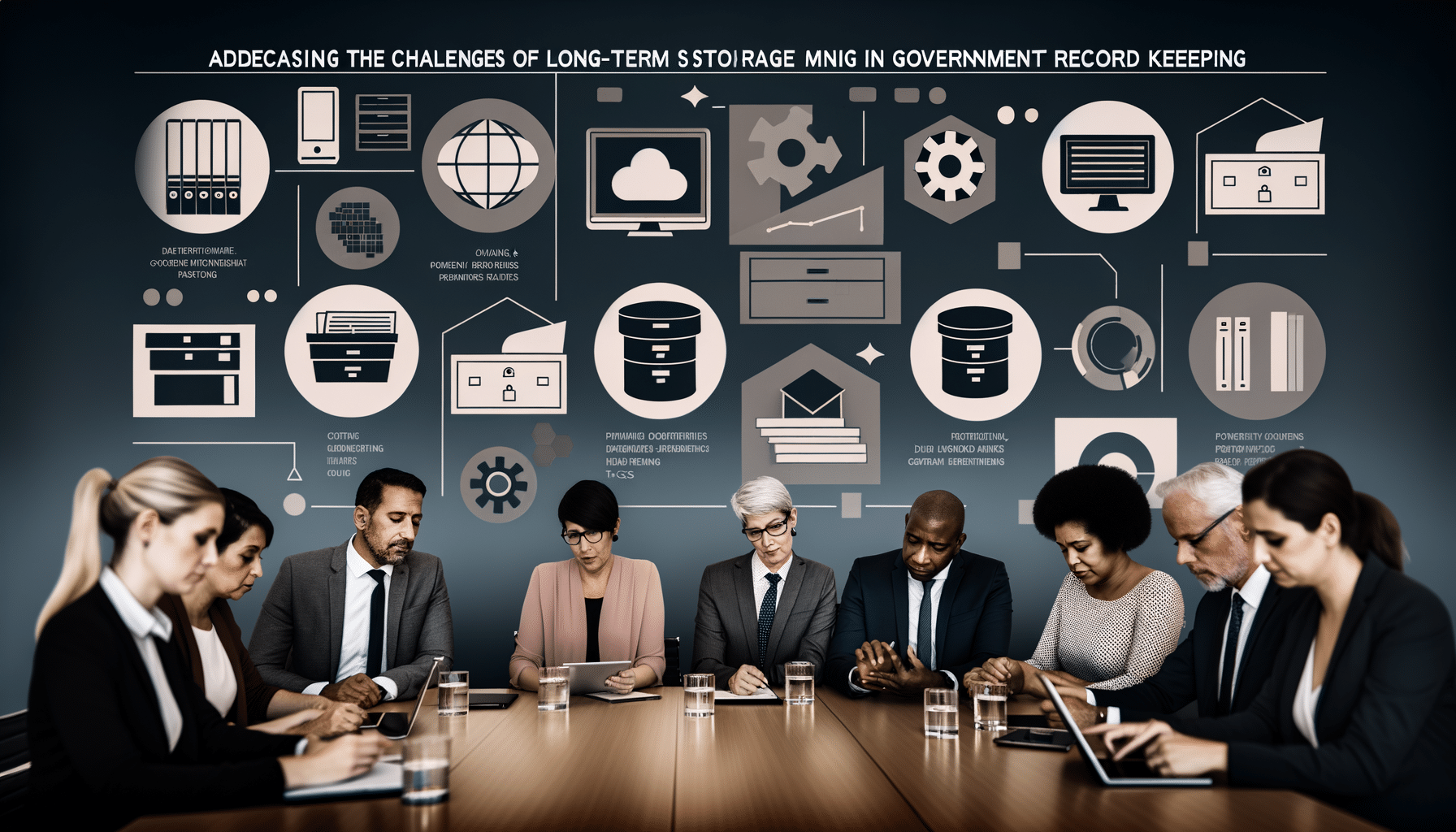- Archival Strategies
- May 23, 2024
Addressing the Challenges of Long-Term Storage in Government Record Keeping

Introduction
In today’s fast-evolving digital world, the challenge of managing government records over the long term is no small feat. The need for efficient, secure, and compliant storage solutions is critical, yet the journey to achieving this can feel daunting. As someone who has navigated the intricacies of technological innovation, I understand these trials and the importance of finding reliable solutions. That’s where platforms like RecordsKeeper.AI come into play, offering a beacon of clarity in the murky waters of long-term storage in government record-keeping.
The Complexity of Long-Term Storage
Managing long-term storage of government records presents a unique set of challenges. First and foremost, the sheer volume of data that government bodies hold is staggering. Finding a way to store this data effectively without losing essential information is crucial. Moreover, compliance with stringent regulations such as GDPR, HIPAA, and SOX is non-negotiable, demanding meticulous attention to detail and robust systems.
Another key consideration is the ever-present threat of data breaches. Ensuring the integrity and security of sensitive information over extended periods requires cutting-edge technology equipped to handle new and evolving threats. Finally, the capability to retrieve records efficiently as and when needed is vital to maintaining governmental oversight and facilitating transparent operations.
Addressing the Challenges with Advanced Technologies
For us at RecordsKeeper.AI, addressing these challenges meant integrating revolutionary technologies into our platform. By employing AI and Blockchain, we create a seamless record management experience that embraces efficiency and security.
1. Automated Categorization & Retrieval: Through AI-powered tools, records are not just stored but intelligently categorized and tagged. This means when you search using natural language queries, the retrieval process is swift and accurate.
2. Secure Data Rooms: By providing data rooms, sensitive files are shared with controlled access, ensuring only authorized personnel engage with the content. Real-time activity tracking further adds a layer of accountability and oversight.
3. Immutable Blockchain Records: For government data that requires the highest levels of integrity, our blockchain integration offers a robust solution. This ensures records are tamper-proof and immutable, guaranteeing authenticity over decades.
Compliance and Accountability: More Than Just Buzzwords
The complexity of governmental operations necessitates compliance and accountability, making these elements more than just trendy jargon. RecordsKeeper.AI automates regulatory workflows tailored to meet stringent standards, be it GDPR, HIPAA, or SOX. Furthermore, comprehensive audit logs and reports maintain a detailed history of every record’s lifecycle, ensuring transparency at every step.
Backup & Recovery: Protecting Government Interests
When I created RecordsKeeper.AI, I knew that backup and recovery would be a critical factor for long-term storage in the government sector. Unexpected events shouldn’t spell disaster. That’s why our platform conducts regular automated backups. In the case of data loss, quick recovery options are at hand, ensuring continuity in government services.
Policy Management: Streamlined Data Retention and Deletion
Efficient record-keeping isn’t just about storing data; it’s about retaining what’s needed and discarding what isn’t. Automated policy management features enforce data retention and facilitate efficient data deletion in line with regulations. This ensures government databases remain current and pertinent without unnecessary clutter.
The Strategic Advantage of Modernization
Modernizing record management isn’t merely about embracing technology; it’s about leveraging these tools to create strategic advantages. By transforming record-keeping from a tedious task into an opportunity, government departments can optimize operations, enhance productivity, and focus on their primary objectives. It’s about doing more with less, making the seemingly impossible task of long-term storage a manageable, strategic asset.
Conclusion
Long-term record storage, particularly in government sectors, is rife with complexities but equally rich with opportunities. With platforms like RecordsKeeper.AI, these seemingly insurmountable challenges become addressable tasks. From automated categorization to unbreachable security measures, compliance management to seamless policy enforcement, the right tools turn potential vulnerabilities into strategic strengths.
I invite all Legal, Finance & Compliance professionals overseeing record-keeping in government to explore the potential of RecordsKeeper.AI. Stay ahead, adapt smarter, and transform your record management strategy into a future-ready endeavor. For more insights and solutions to digital challenges, follow my journey as an entrepreneur navigating the world of tech innovation.
Toshendra Sharma is the visionary founder and CEO of RecordsKeeper.AI, spearheading the fusion of AI and blockchain to redefine enterprise record management. With a groundbreaking approach to solving complex business challenges, Toshendra combines deep expertise in blockchain and artificial intelligence with an acute understanding of enterprise compliance and security needs.
Related Posts

Why Data Archiving is Essential for Effective Record Keeping in Public Sector
Discover the role of data archiving in improving public sector record efficiency.
- July 6, 2024
Archives
- December 2024
- November 2024
- October 2024
- September 2024
- August 2024
- July 2024
- June 2024
- May 2024
- April 2024
- March 2024
- February 2024
- January 2024
- December 2023
- November 2023
- October 2023
- September 2023
- August 2023
- July 2023
- June 2023
- May 2023
- April 2023
- March 2023
- February 2023
- January 2023
- December 2022
- November 2022
- October 2022
- September 2022
- March 2019
Want to get more content like this?
Signup to directly get this type of content to your inbox!!
Latest Post
Organizing External Auditor Access
- December 22, 2024
Document Control in Manufacturing Plants
- December 21, 2024
Handling Rush Financial Report Requests
- December 20, 2024
Managing Record Access After Staff Changes
- December 19, 2024





